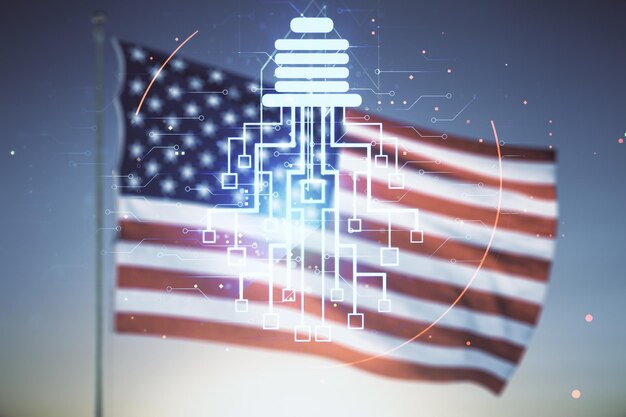The New Reality for Big Tech: Navigating a Trump Presidency
Big Tech, the collective term for the world’s largest and most influential technology companies,
faced an uncertain future
under a Trump presidency. With Donald Trump’s election in 2016, many in the industry braced for potential regulatory and political challenges that could upend their business models and operations.
Antitrust Investigations
One of the earliest indicators of this new reality came in the form of antitrust investigations. In 2019, the Department of Justice (DOJ) and the Federal Trade Commission (FTC) announced investigations into Apple, Amazon, Facebook, and Google. These probes were aimed at examining the market power and competitive practices of these tech giants.
Data Privacy
Another area of concern for Big Tech during a Trump presidency was data privacy. In 2018, the European Union (EU) enacted the link, which gave EU residents new data privacy rights. Many in the tech industry expected similar legislation to be introduced in the United States, and they were not disappointed. In 2019, the House of Representatives passed the link (ADPPA), which, if passed in the Senate and signed into law by President Trump, would have given Americans the same data privacy rights as Europeans.
Political Advertising
The role of technology companies in political advertising also came under scrutiny during a Trump presidency. In the wake of Russia’s interference in the 2016 election, Big Tech faced intense pressure to regulate political advertising on their platforms. In March 2019, Facebook announced it would begin labeling political ads and creating a searchable archive of them. Google followed suit in May 2019 with similar measures. These actions were designed to increase transparency and prevent foreign interference in U.S. elections.

The Complex Relationship Between Big Tech and the White House: A Shift under the Trump Presidency
Big Tech companies, including Apple, Amazon, Microsoft, Google, and Facebook, have long held a significant influence in the American political landscape. This relationship, however, has evolved considerably over the past few decades and reached new heights under different administrations.
Pre-Trump Era: Cozy Collaboration
During the Obama Administration, there was a notable symbiotic relationship between the White House and Big Tech. With President Obama’s emphasis on technology, innovation, and digital transformation, Silicon Valley became an integral part of his administration’s policy initiatives. In return, Big Tech companies enjoyed favorable regulatory environments, government contracts, and public recognition for their role in driving economic growth and innovation.
The Trump Presidency: A New Tone
However, the Trump Presidency brought a new tone to the relationship between Big Tech and the White House. President Trump’s rhetoric against Silicon Valley giants was often critical, accusing them of bias, monopolistic practices, and even election interference. This shift in tone raised concerns among tech companies and sparked a new era of tensions between the White House and Big Tech.
Regulatory Actions and Investigations
Under President Trump, several regulatory actions were taken against Big Tech companies. For instance, the Federal Trade Commission (FTC) launched an antitrust investigation into Google‘s advertising practices in 2019. Additionally, the Department of Justice (DOJ) and the FTC announced an antitrust review of the tech industry’s dominant players in 2020. These investigations represented a departure from the previous administration’s more lax approach to Big Tech regulation.
Political Pressure and Executive Orders
Beyond regulatory actions, the Trump White House also applied political pressure on Big Tech companies. In 2019, President Trump signed an executive order targeting social media platforms following accusations of censorship against Twitter. This order threatened to strip these companies of their liability protections under Section 230, a critical piece of legislation that shields internet platforms from legal responsibility for user-generated content.
Impact and Future Implications
The complex relationship between Big Tech and the White House under President Trump set the stage for an ongoing dialogue about the role of technology companies in American politics. With the Biden Administration now in power, it remains to be seen how this dynamic will evolve further.
Conclusion
In conclusion, the relationship between Big Tech and the White House has undergone significant changes over the years. From a cooperative collaboration during the Obama Administration to increased regulatory scrutiny and political pressure under Trump, this relationship continues to shape the tech industry’s role in American society and politics. As we move forward, it is essential to monitor these developments closely to understand their potential implications for consumers, businesses, and the democratic process as a whole.

Understanding the Trump Administration’s Stance on Big Tech
Analysis of President Trump’s Campaign Promises and Views on Technology Companies
During his presidential campaign, President Donald J. Trump expressed concerns over several issues related to Big Tech. Here’s a closer look at his campaign promises and views on data privacy and security, anti-trust regulations, and immigration policies:
Data Privacy and Security
Trump frequently criticized Apple for not unlocking the encrypted iPhone used by one of the San Bernardino shooters. He also advocated for stronger measures to protect American jobs and data from foreign threats, especially those originating in China.
Anti-Trust Regulations
Trump questioned the dominance of tech giants such as Google, Amazon, and Facebook, expressing concerns about their market power and potential impact on smaller businesses. He suggested that antitrust laws may need to be reevaluated to ensure fair competition in the tech industry.
Immigration Policies
Trump’s stance on immigration policies included calls for stricter enforcement and potential reforms to the H-1B visa program. He argued that tech companies were taking advantage of this program to hire foreign workers over American talent, which could harm domestic employment opportunities.
The Appointment of Key Figures with Critical Views on Big Tech
To further emphasize his administration’s stance on Big Tech, Trump appointed several key figures who shared critical views:
Jeff Sessions (Former Attorney General)
As attorney general, Jeff Sessions led the Department of Justice’s antitrust division and was known for his skepticism towards Big Tech. He expressed concerns about their market power and potential impact on consumers.
Ajit Pai (FCC Chairman)
Ajit Pai, who headed the Federal Communications Commission, was a vocal critic of net neutrality regulations. Trump’s administration rolled back these rules, which many argued could benefit tech giants by allowing them to prioritize their content over smaller competitors.
Peter Thiel (Trump Supporter and Adviser)
Silicon Valley entrepreneur Peter Thiel, a Trump supporter and adviser, was known for his critical views on the industry’s dominant players. Although he had previously invested in tech companies, Thiel’s public criticisms highlighted concerns about their monopolistic tendencies and potential risks to innovation and competition.

I Regulatory Challenges for Big Tech under the Trump Administration
Antitrust enforcement and investigations
During the Trump Administration, there were significant regulatory challenges for the tech industry, particularly in the area of antitrust enforcement and investigations. One possible outcome was the possible break-up of major tech companies, such as Google, Facebook, and Amazon. While some argued that this would promote competition and innovation, others worried about the potential negative impacts on these businesses’ ability to develop new products and services.
Data privacy regulations and surveillance
Another major regulatory challenge was the issue of data privacy regulations and surveillance. On one hand, there was a need to balance individual privacy rights with national security concerns. On the other hand, tech companies argued for self-regulation, fearing that heavy-handed regulations could stifle innovation and growth.
Balancing national security and individual privacy rights
The Trump Administration’s position on data privacy was ambiguous at best, with some officials calling for stronger protections while others seemed more concerned with national security interests. This created a challenging regulatory environment for tech companies, who were left to navigate the complex intersection of individual privacy and government surveillance.
Role of self-regulation for tech companies
The tech industry argued that they were best positioned to regulate themselves, pointing to their success in developing and implementing privacy policies and practices. However, this approach was met with skepticism from some advocacy groups and policymakers who believed that stronger government regulations were necessary to protect consumers’ privacy rights.
Intellectual property enforcement
The Trump Administration also took a more aggressive stance on intellectual property enforcement. This included increasing efforts to crack down on patent litigation and so-called “patent trolls,” as well as changes in the patent eligibility standards. While some saw these moves as a necessary step to promote innovation and protect intellectual property, others worried that they could stifle creativity and limit the ability of small businesses to compete.
Immigration policies and their impact on the tech industry workforce
Finally, the Trump Administration’s immigration policies had a significant impact on the tech industry workforce. The administration’s restrictions on H-1B visas, green cards, and other work authorizations made it more difficult for tech companies to hire and retain talented workers. This led some companies to consider relocating jobs to other countries or offshoring work in order to stay competitive.

IV. Strategies for Big Tech in Navigating the Trump Administration
Adapting to regulatory changes and potential legal challenges
- Collaboration with regulators and policymakers: Big Tech companies are taking a collaborative approach to adapt to regulatory changes and potential legal challenges. They are engaging in open dialogue with regulators, policymakers, and industry experts to understand the implications of new regulations and to proactively address concerns. This includes participating in public consultations, providing feedback on proposed rules, and working with trade associations and lobbying firms.
- Proactive engagement in the political process: Many tech companies are also increasing their political activity to shape the regulatory environment. This includes lobbying, campaign contributions, and grassroots advocacy efforts. By engaging in the political process, tech companies hope to influence policy decisions that could impact their businesses.
Investing in public relations and crisis management
- Building relationships with key stakeholders and opinion leaders: Tech companies are investing in public relations and crisis management to mitigate potential reputational risks. They are building relationships with key stakeholders, including media outlets, industry experts, and opinion leaders. By engaging in ongoing dialogue and providing transparent information, tech companies hope to build trust and maintain positive public perception.
- Mitigating potential reputational risks: Tech companies are also taking steps to mitigate potential reputational risks. This includes addressing concerns related to data privacy, security, and misinformation on their platforms. They are investing in robust data security measures, implementing content moderation policies, and collaborating with fact-checking organizations to address the spread of false information.
Diversifying business models and strategic partnerships
- Expanding into new markets and industries: Many tech companies are diversifying their business models to reduce their reliance on any one market or product. This includes expanding into new markets, such as healthcare or education, and investing in new technologies, such as artificial intelligence and blockchain.
- Building alliances with competitors and traditional industries: Tech companies are also building strategic partnerships with competitors and traditional industries to expand their reach and influence. This includes collaborating on research and development projects, investing in joint ventures, and participating in industry consortia.
Embracing transparency, accountability, and ethical business practices
- Implementing robust data security measures: Tech companies are investing in robust data security measures to address concerns related to privacy and data protection. This includes implementing strong encryption protocols, conducting regular security audits, and providing users with greater control over their data.
- Addressing concerns related to misinformation, disinformation, and bias in their platforms: Tech companies are also taking steps to address concerns related to misinformation, disinformation, and bias on their platforms. This includes implementing content moderation policies, collaborating with fact-checking organizations, and providing users with greater transparency into how algorithms work.

Conclusion
Recap of the Challenges and Opportunities Facing Big Tech under the Trump Administration
During the Trump Administration, Big Tech companies faced numerous challenges and opportunities that tested their ability to adapt and evolve in a rapidly changing political and regulatory landscape. The administration’s aggressive stance on issues such as data privacy, antitrust regulations, and foreign interference in elections presented both risks and opportunities for tech companies. On one hand, the administration’s actions heightened public scrutiny of these firms, leading to increased pressure to address concerns around data privacy and election security. On the other hand, the administration’s pro-business stance created opportunities for tech companies to collaborate with the government on initiatives related to technology development and innovation.
Long-term Implications for the Tech Industry in a Post-Trump Era
As we enter a new political era, it’s important to consider the long-term implications of these developments for the tech industry. While the specific policies and priorities of the Biden Administration remain to be seen, it’s clear that data privacy, antitrust regulations, and election security will continue to be key areas of focus. Companies that are able to adapt and respond proactively to these issues will be better positioned for success in the post-Trump era. Moreover, the increasing importance of technology in our daily lives means that tech companies will continue to face significant challenges and opportunities, both from a regulatory standpoint and in terms of innovation and competition.
Final Thoughts on the Need for Collaboration, Transparency, and Adaptability
Given the ongoing challenges and opportunities facing Big Tech, it’s essential that these companies prioritize collaboration, transparency, and adaptability. Collaboration with regulators, policymakers, and other stakeholders can help companies navigate complex regulatory environments and build trust with the public. Transparency, meanwhile, is critical for maintaining that trust and demonstrating a commitment to ethical business practices. And finally, adaptability – the ability to respond quickly to changing circumstances and evolving customer needs – will be key for tech companies looking to stay competitive in an increasingly crowded marketplace.
Conclusion
In conclusion, the Trump Administration’s approach to tech policy presented both challenges and opportunities for Big Tech. As we look ahead to the post-Trump era, it’s clear that data privacy, antitrust regulations, and election security will continue to be key areas of focus. Companies that are able to prioritize collaboration, transparency, and adaptability will be better positioned for success in this new reality.
